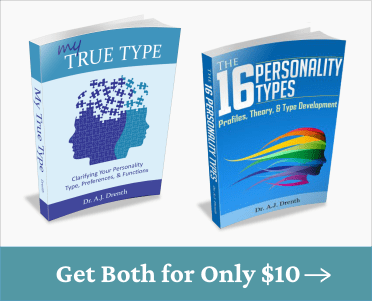
In order to clarify and understand your personality type, it is critical to identify your preferred personality functions (e.g., Ni, Ti, Fi, etc.). In my book, My True Type, I extensively explore each of the eight functions and provide helpful strategies for identifying your preferred functions. The book also includes a personality assessment that aims to clarify your preferences and functions, thereby providing a thorough and well-rounded assessment of your personality. Here, I will share a part of that assessment called The Function Clarifier™, which can help you identify your preferred functions.
Instructions: To identify your preferred functions, rank each of the following eight descriptions from 1-8, using each number only once.
1 (“Most true of me”) – 8 (“Least true of me”)
a.___I am a take-charge, no-nonsense type of person. I’m not afraid to take the lead or issue directives or correctives to others. My mind seems to work quite efficiently and decisively. It is typically easy for me to make decisions, give advice or instructions, and get things done without getting bogged down with emotional concerns. Others see me as firm and forthright, perhaps even blunt. I enjoy staying busy and using my time effectively. On the whole, I take a rational approach to life and can feel uncomfortable or inadequate in emotional situations. I’m more inclined to offer advice than to spend time commiserating. Consequently, I’m most comfortable in work-related situations, especially when analyzing problems, completing tasks, or issuing directives. I also enjoy thinking about strategies and logistics, or ways of making systems or processes more efficient and productive.
b.___ In some respects, I feel like an alien in the world. I am more of an observer and analyzer of life than a participant. This can make it scary for me to act or make big changes in my life. Typically, my mind is fairly zen-like, characterized by a state of relaxed awareness that straddles the conscious and unconscious mind. In this state, my mind is not restless or flooded with random ideas, but is generally calm and synchronized. When presented with a problem, my mind works in a unified way to simultaneously see different perspectives and “realize” answers. At times, these answers or insights can come suddenly and all at once, like a tidal wave of knowing; for me, there is a real difference between believing something and knowing something. I can get discouraged, however, when others don’t seem to understand or respond to my insights with a similar sense of conviction. In many cases, people seem to disregard my insights, suggest I’m being too negative or pessimistic, or think I’m blowing things out of proportion. But I’m simply being honest, calling things as I see them, and in most cases, I’m eventually proven right. Indeed, I see it as my primary role to perceive things accurately and correct false perceptions—to bring the truth to light. Despite seeming opinionated and strong-minded, it is not unusual for others to turn to me for answers, insights, or advice.
c.___I spend a fair amount of time surveying and weighing my personal feelings and values. Since it is important that I live a moral and authentic life, I see it as important to consider exactly what that means and might look like for me. I need time to listen to what my heart and conscience tell me is right. I think the world would be a better place if everyone learned to tune into his or her inner moral compass. Part of my moral code involves “fighting for the underdogs”—those who are poor, sick, disabled, victims of injustice, or otherwise find themselves in unfortunate circumstances. I also enjoy caring for children, plants, animals, or whatever personally affects or moves me. I have the ability to deeply empathize with others. When I imagine myself in others’ shoes, I feel for them and it inspires me to respond. Others typically see me as a good listener—empathetic and non-judgmental. At times, I can feel emotionally over-burdened, having internalized others’ pain and struggles. When it comes to emotions, I tend to be more of a receiver than an expresser. I manage my feelings on my own rather than unloading them onto others. I therefore feel that most people don’t really know me or see what is most important to me.
d.___I am a “people person.” I’m generally warm and personable, with a knack for making quick connections with people. I like to talk and routinely enjoy conversation with friends, family, co-workers, and even strangers. Generally speaking, I am firm and forthright in expressing my views and opinions. While typically tactful, I am reluctant to let my voice go unheard. I enjoy teaching, managing, and directing people, helping them to be and achieve their very best. In many ways, I feel responsible for the emotional well-being and success of others. I want them to excel, both individually and interpersonally. I enjoy finding ways of bringing people together, helping them communicate and get on the same emotional page. If I’m being honest, I’m really not as good at listening to others as I am at advising or teaching them. On more than one occasion, I have been guilty of giving unsolicited advice or opening my mouth when I probably shouldn’t have. Nevertheless, people often turn to me for support and guidance regarding their lives and relationships.
e.___I am generally a person of routine. I see no problem with continuing to do things the way they have been done in the past, with sticking to the “tried and true.” Doing so makes life simpler and keeps things consistent. I tend to agree with the old saying, “If it ain’t broke don’t fix it!” I don’t understand why so many people think it’s a good idea to modify or abandon time-tested methods or traditions (i.e., The Constitution, religious traditions, etc.). I personally believe that if something has been resilient enough to stand the test of time, it’s probably worth preserving and protecting. I enjoy reflecting on my personal past, as well as various traditions—familial, religious, historical, political, etc.—that are important to me. I feel safe, secure, nostalgic, and reassured when I reflect on these things. When it comes to money and material goods, I tend to be fairly conservative. I am typically careful not to be wasteful or extravagant in my expenditures. When it comes to work, I like to know exactly what the rules and procedures are so I can do my job properly. I feel the details of a job are important and should not be ignored or overlooked. Others see me as a loyal, reliable, dutiful, and responsible.
f.___I am a fun-loving person who relishes spontaneous action. I don’t waste time over-thinking things. I usually perform better and enjoy myself more when I just do what comes naturally. I love taking in new experiences and sensations—new sights, sounds, tastes, and so on. I enjoy using my hands and losing myself in activities such as sports, sex, cooking, driving, dancing, shopping, exercising, and the like. If given a choice, I prefer to be up and moving around rather than sitting. I tend to get restless fairly quickly and am happier when I’m being active. I’m not a terribly abstract person and have never been a huge fan of book learning. I’d rather learn from experience than from books or lectures. In my view, experience is probably life’s best teacher. I’m also a highly observant person. I tend to notice and recall details that others may overlook. Keeping pace with current styles and fashions is also fun for me, including things like trendy cars, phones, fashions, hairstyles, decor, etc.
g.___Independence, autonomy, and personal freedom are among my highest values; some people might even call me a loner. While I have little interest or aptitude in leading or managing others, I also don’t want people controlling me or telling me what to do. When working within a system or organization, I often find myself at odds with it and end up looking for ways to circumvent what I see as unnecessary rules or inefficient methods. This of course can be anxiety-producing, so working for myself is probably my best option. Perhaps more than anything, I want to find work that I enjoy; my work is of utmost importance to me. Unfortunately, finding my ideal work has been difficult due to my strong need for autonomy, as well recurrent indecisiveness about what I should be doing. Efficiency is another of my top priorities. Thinking of time as a currency for accomplishment, I can be rather impatient when it comes to navigating unexpected hurdles or obstacles. Outwardly, I present as easygoing and affable, readily adapting and meshing to the social context. Inwardly, I am far more serious and resolute, constantly thinking about my work or projects and what my next step should be.
h.___I have a restless and active (some might even say hyperactive) mind. It is constantly generating new ideas and seeing new connections, associations, and possibilities (“the possibilities are endless!”). I often see random connections or parallels between things that others fail to see or appreciate. I love playing with words, ideas, associations, and quips. Compelled to explore and exhaust all the options and possibilities, I struggle to make decisions or draw firm conclusions. When a promising new idea or possibility comes to me, I tend to get really excited and want to share it with others. Unfortunately, the excitement often wanes once the novelty wears off or the idea proves less tenable. These ups and downs can make it hard for me to stick with one thing or to finish what I start. Since I tend to bounce from one idea and interest to the next, I sometimes wonder if I’ll ever accomplish anything important. I know I have a lot of creative potential, but I often struggle to harness and focus it. Others may see me as quirky, chatty, distractible, inquisitive, creative, unconventional, and open-minded.
Function Clarifier™ Scoring Key

___ a. = Extraverted Thinking (Te)
___ b. = Introverted Intuition (Ni)
___ c. = Introverted Feeling (Fi)
___ d. = Extraverted Feeling (Fe)
___ e. = Introverted Sensing (Si)
___ f. = Extraverted Sensing (Se)
___ g. = Introverted Thinking (Ti)
___ h. = Extraverted Intuition (Ne)
Interpretation: Translating Your Functions into a Type
There are a few different methods of translating your function rankings into a personality type. Method 1 is recommended based on the design and intent of the assessment. However, the other two methods are also interesting and will prompt you to think about your type and the typing process in different ways. Be aware that your results may differ slightly depending on which method you use, keeping in mind that the assessment was primarily designed for Method 1.
Method 1: Identify Dominant & Auxiliary Functions
The simplest and recommended method is to start with your dominant function (i.e., #1 rank) and then identify which of its two possible auxiliary function options you preferred more:
- Te paired with either Si (ESTJ) or Ni (ENTJ).
- Ni paired with either Te (INTJ) or Fe (INFJ).
- Fi paired with either Ne (INFP) or Se (ISFP).
- Fe paired with either Si (ESFJ) or Ni (ENFJ).
- Si paired with either Te (ISTJ) or Fe (ISFJ).
- Se paired with either Ti (ESTP) or Fi (ESFP).
- Ti paired with either Ne (INTP) or Se (ISTP).
- Ne paired with either Ti (ENTP) or Fi (ENFP).
Method 2: Preferences
A second approach involves translating your function rankings into preferences (e.g., E vs. I). To do so, refer to your original rankings and add them together as shown below. You can then determine your type by using the preference associated with the smallest sum total for each of the four dichotomies (i.e., E-I, S-N, T-F, J-P):
E or I?
- Te + Fe + Se + Ne rankings = Extraversion (E)
- Ni + Fi + Si + Ti rankings = Introversion (I)
S or N?
- Si + Se = Sensing (S)
- Ni + Ne = Intuition (N)
T or F?
- Te + Ti = Thinking (T)
- Fi + Fe = Feeling (F)
J or P?
- Te + Fe = Judging (J)
- Se + Ne = Perceiving (P)
Method 3: Considering the Inferior Function
As discussed in My True Type, if you’re having trouble determining your strongest / dominant function, at times it’s easier to identify your weakest / inferior function. Doing so can help you clarify your dominant function as well as your overall type. In this light, you might appreciate the following approach.
Locate your T, F, S, and N totals from Method #2. Of the four sums, the largest sum should correspond to your inferior function. Because T and F (as well as S and N) are considered typological opposites, we’d expect small T sums to be accompanied by large F sums (and vice-versa), and small N sums by large S sums (and vice-versa):
- Dominant T (smallest sum) with Inferior F (largest sum): INTP, ISTP, ENTJ, ESTJ
- Dominant F with Inferior T: INFP, ISFP, ENFJ, ESFJ
- Dominant N with Inferior S: INFJ, INTJ, ENFP, ENTP
- Dominant S with Inferior N: ISTJ, ISFJ, ESFP, ESTP
Learn More in Our Books:
My True Type: Clarifying Your Personality Type, Preferences & Functions
The 16 Personality Types: Profiles, Theory & Type Development
